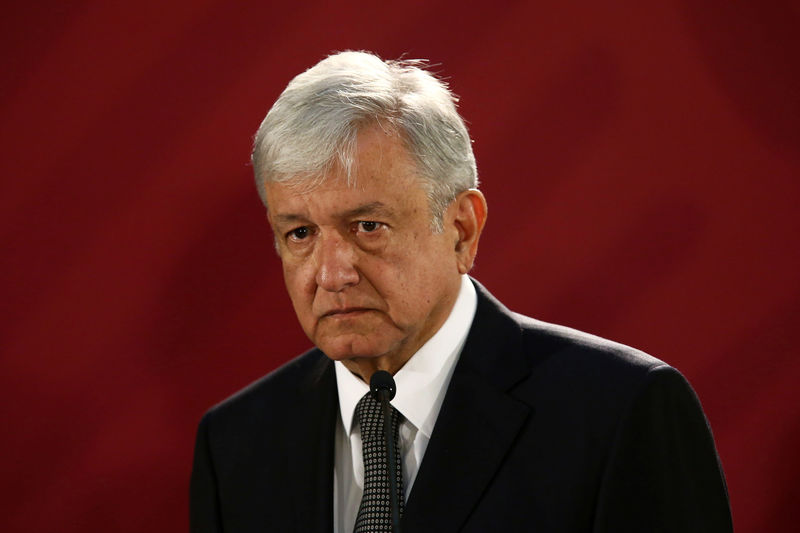By Frank Jack Daniel and David Alire Garcia
MEXICO CITY (Reuters) - Mexico's new president, Andres Manuel Lopez Obrador, said on Wednesday he would not cancel contracts issued to foreign and national oil companies by his predecessor but challenged them to pump oil quickly or no further oil fields would be offered.
Lopez Obrador took office on Saturday, promising to increase the government's role in the energy industry and roll back what he described as a 36-year neo-liberal era in which successive governments gradually opened up the economy.
During the election campaign, he pledged to review the contracts issued under a landmark energy reform for any signs of corruption. He and his team have not said they have uncovered any wrongdoing in the contracts already awarded.
"The contracts will not be canceled, so there won't be a loss of confidence," he told reporters at a daily news conference.
Under Mexican law, the independent oil regulator known as the National Hydrocarbons Commission (CNH) runs the auctions, supervises the contracts and is the only entity that can cancel the contracts.
How Lopez Obrador handles the energy industry will be one of the biggest challenges of his six-year term. He has promised to raise oil production from historic lows but has not fully clarified how, beyond promising more investment in the public sector.
During the transition the former Mexico City mayor issued a series of abrupt policy changes that battered stocks, bonds and the peso. Despite the new president's efforts to reassure investors in recent days, markets have yet to recover lost ground.
The 65-year-old president, however, did not rule out inviting more private-sector investment to Mexico's untapped deepwater fields in the Gulf of Mexico even as he sharply criticized the energy reform a few days before in his inauguration speech.
He said companies that have already won contracts should hurry up with their investment and with pumping oil.
"We can't keep on giving out territory for the extraction of hydrocarbons if there is no investment and there is no production," he said, adding he was opposed to companies "speculating" with the contracts.
"We want them to demonstrate that they are going to invest and produce oil. We will make a decision based on results," he said, adding that there will be a three-year "truce," without giving further details.
It can take years before investments turn into commercial-scale production. The last government said the 107 contracts could generate $161 billion of investment over the life of the contracts. Industry experts say it will be several years before significant amounts of crude flows from the projects.
Capital Economics said the challenge of producing significantly more oil in three years would be very hard to meet, suggesting it could take more than twice that time for private oil production to really take off in Mexico.
"It is the clearest sign yet that AMLO intends to stop the much-vaunted energy reform in its tracks" the London-based research group said in a note, referring to Lopez Obrador by a common nickname.
According to CNH data, firms have committed hundreds of millions of dollars in exploration and other work plans approved by the regulator.
Lopez Obrador did not say whether he would postpone or cancel a round of auctions set for next February, though analysts have said the tenders are unlikely be carried out as scheduled.
The tenders cover 46 oil and gas blocks, including nine shale areas, in addition to partnership rights for seven onshore joint ventures with Pemex.
NOT ONE BARREL
Mexico's crude production fell to the lowest level in decades under the previous government. Lopez Obrador says investment in state-owned oil company Pemex has declined as a result of the reform and private sector investment has not risen significantly.
Responding to a question about future deepwater oil auctions, Lopez Obrador said the projects had not produced "one barrel of oil."
While the complicated deepwater projects snapped up by the likes of Royal Dutch Shell (LON:RDSa), Exxon Mobil Corp (NYSE:XOM) Chevron Corp (NYSE:CVX) and Total SA (PA:TOTF) are still in the exploration phase, some onshore projects offered under the reform are now producing about 13,400 barrels per day (bpd), official data shows.
That includes about 9,200 bpd from two onshore joint ventures with Pemex in which private partners operate the projects, plus another 4,200 bpd from projects operated by new private producers.

Pemex produced about 1.76 million bpd in October after 14 consecutive years of decline.